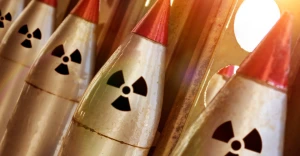
Wagner are first to shoot down Il-22: Russia has at most 10 of them - Ukrainian Air Force
During the Wagner PMC's mutiny, a valuable and rare Il-22 aircraft of the Russian army has been shot down. This is the first case of the downing of such aircraft during the war
Yuriy Ihnat, a spokesman for the Air Force of the Ukrainian Armed Forces, shared the information with NV in an interview.
In addition to the Il-22, Wagner mercenaries destroyed 2 combat helicopters (one Mi and one Ka-52), one Mi-8 military transport helicopter, and another Mi-8 electronic warfare helicopter, which serves as an obstacle. The latter, he said, is very valuable to the Russian army, and there are "not many such helicopters in Russia."
Regarding the Il-22, Ihnat noted that this aircraft had already been hit by Ukrainian anti-aircraft missiles, but that the Ukrainian Armed Forces only damaged it - it was "a little bit torn up," but returned to the Russian base, where it was probably restored.
The Air Force spokesperson noted that the Il-22 operates together with an A-50 aircraft, which guerrillas in Belarus tried to blow up with a drone.
"They are always flying in southern Ukraine in the Azov and Black seas, tracking our assets located in Ukraine by radar," noted Ihnat.
"This is also an important piece of equipment that is in service with the Russian army. I think there are up to 10 of them [in Russia], just like the A-50. But seeing it for the first time is also good news for us <...> And the pilots are the most valuable asset (10 crew members were killed in the Il-22 alone - Ed.) You can't train pilots overnight, it takes years to train a real pilot who can perform combat missions," Ihnat said.
Prigozhin's mutiny in Russia
For several months, there has been a conflict between Yevgeny Prigozhin, the financier of Wagner PMC, and the Russian Ministry of Defense. However, the situation escalated quickly on the evening of June 23.
Allegedly, Russian troops launched a missile attack on the Wagner base. Yevgeny Prigozhin, the leader of the Wagner PMC, announced a "march of justice" and stated that 25,000 mercenaries were heading to Moscow after the Russian leadership refused to hand over Defense Minister Sergei Shoigu and Chief of the General Staff Valery Gerasimov.
On Saturday, June 24, in addition to Rostov-on-Don, where they initially gathered around the headquarters of the Southern Military District, the Wagner group also took control of Voronezh. Their convoys, which had diverted from the Ukrainian border, were moving towards Moscow. Military aircraft and artillery under Shoigu's control attempted to stop them. The units of Wagner PMC were last spotted in the Lipetsk region. In Moscow itself, defensive positions were established, trenches were dug, and all security forces were mobilized.
However, on the evening of June 24, the press service of the self-proclaimed President of Belarus, Alexander Lukashenko, released a statement in which the head of the Wagner PMC stated that he was ready to stop the advance of his mercenaries' military convoys, which were already approaching Moscow, and to reach an agreement with the Kremlin. Prigozhin allegedly agreed on this during a conversation with Lukashenko.
Instead, Prigozhin announced that the Wagner group had stopped their advance and returned to their field camps before reaching 200 km from Moscow. He stated, "In a day, we covered a long distance, stopping only 200 km away from Moscow. During this time, no blood was shed. However, the moment may come when blood will be spilled. Therefore, taking full responsibility, we are turning our columns around and heading back to the field camps as planned."
Subsequently, Prigozhin and all his fighters left the headquarters of Russia's Southern Military District. Russian leader Vladimir Putin promised that Prigozhin would be able to go to Belarus, and Russia would close the criminal case against him.
According to CNN, US intelligence knew about the plans of the Wagner leader to go against the leadership of the Russian regular army, but did not think that the escalation would happen so quickly.
Analysts examining the data on visits to Google News by Russian internet service providers between June 23 and 24, during the coup, have arrived at the conclusion that a minimum of 5 telecommunications companies, including Rostelecom, U-LAN, and Telplus, blocked the Google News service, which collects news from various sources.
The deal reached through Lukashenko's mediation is likely to eliminate the Prigozhin-led Wagner PMC in its current form, although some elements of the organization may continue to exist under the Russian Defense Ministry, according to the Institute for the Study of War.
China expressed support for Russia in ensuring the stability and development of the country, commenting on Wagner PMC starting a coup against the Kremlin.
On June 26, the administration of the self-proclaimed president of Belarus didn't confirm Yevgeny Prigozhin's arrival in the country.
On Monday, June 26, Putin gave a speech in which he offered the Wagner PMC fighters three options for future actions: join the Russian Defense Forces, go to Belarus with other PMC members, or return to their families. Putin emphasized that he would "fulfill his promise."
On June 26, Wagner leader, Yevgeny Prigozhin, said that the main goal of the mutiny was "to prevent the destruction of the Wagner PMC, not to overthrow the government" and called it a "march of justice." He also claimed that the offensive on Moscow had stopped because the mercenaries "did not want to shed much blood."
- News














































